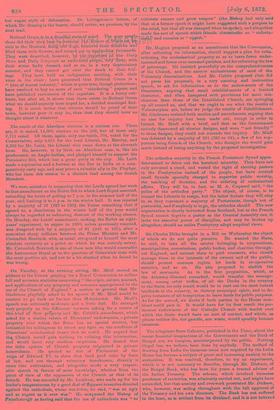Oh Tuesday, at the evening sitting, Mr. Miall moved an
address to the Crown praying for a Royal Commission to collect full and accurate statistics concerning " the origin, nature, amount, and applications of any property and revenues appropriated to the use 'of the Church of England," a motion so general that Mr Gladstone playfully asked in his speech if Mr. Miall would be content to go back no further than Melchisedek. Mr. Miall's speech was extremely moderate and a little dull. He enlarged very properly on the difference between asking for a return of this kind of State priiperty and Mr. Cuhitt's amendment, which asked for a similar return of Dissenters' endowments, —private property over which the State has no special control, but intimated his willingness to throw any light on the condition of Dissenters' ecclesiastical trusts that he could. He argued that the Church would gain nothing by refusing this information, and would incur very needless suspicions. lie denied that the tithe system of Church property originated in private benevolence. He quoted an Act of Parliament of the reign of Edward VI. to show that land 'paid tithe by force of law, and not through voluntary beneficence, directly it came into cultivation, and altogether made a very respect- able speech in favour of more knowledge, whether from the point of view of the opponents of the Church or that of its friends. lie was seconded by Mr. Leatham, who made up for his leader's temperateness by a good deal of flippant invective directed against the cathedrals, whose con lition, he said, " was as ugly and as urgent as it ever was." He misquoted the Bishop of Peterborough as having said that the use of cathedrals was " to cultivate canons and grow vergers" (the Bishop had only said that at a former epoch it might have suggested such a purpose to the mind, but that all was changed when he spoke), and altogether made the sort of speech which friends characterise as " unfortu- ;ittis/' and enemies as " uppish."


































 Previous page
Previous page